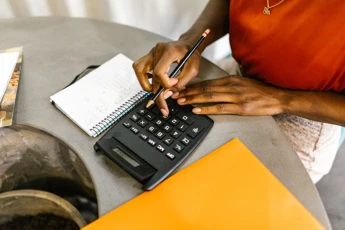In this article:
What is a gifted deposit?
How does a gifted deposit work?
How much money can be gifted?
How does a gifted deposit affect your mortgage?
Advantages of a gifted deposit
Disadvantages of a gifted deposit
What are the tax implications of a gifted deposit?
How do I talk to my family about a gifted deposit?
What other options are available if I can’t get a gifted deposit?
Speak to an adviser
FAQs
What is a gifted deposit?
A gifted deposit is a financial contribution made by a family member to help with the deposit on a home purchase. Gifted deposits can be a big help if you’re struggling to save up enough money for a deposit on your own. They can help you reach the minimum deposit threshold required by lenders, which often allows you to borrow a larger amount.
How does gifting a deposit work?
The process of gifting a deposit comes with specific requirements to ensure you can use it properly. Typically, a letter must be signed between the donor and the homebuyer. This becomes a legal document that confirms that the money is a gift and doesn’t need to be paid back.
A gifted deposit letter usually includes:
- Your name and address
- Donor’s name and address
- The relationship between you and the donor
- Amount being gifted
- Confirmation it's a gift and won't be repaid
- Confirmation they won't have a stake in the property
- Potential proof of their financial stability (bank statements)
The donor may also need to provide a bank statement to verify the source of the money, which safeguards against money laundering.
How much money can be gifted?
There isn't a universally set limit on how much money can be gifted in a house deposit. It generally depends on the specific mortgage lender and their policies.
Lenders assess your ability to repay the mortgage based on your income and existing debts. A gifted deposit on top of what you’ve saved can strengthen your application by reducing the amount you need to borrow.
By using our borrowing power calculator, you can work out how much you could borrow based on the size of your deposit, both with and without the gifted funds.
How does a gifted deposit affect your mortgage?
In most cases, a gifted deposit won’t impact your affordability, as you won’t need to pay it back. However, bear in mind that if the donor is not a direct family member, the lender may take this into account.
With a gifted deposit, you put down a larger down payment, reducing the amount you need to borrow. This leads to a lower loan-to-value (LTV), which makes your application more attractive to lenders and increases your chances of getting approved.
Better still, by reducing the loan amount with a gifted deposit, you'll have a smaller monthly mortgage payment. This can significantly improve your affordability, allowing you to potentially qualify for a larger mortgage/more expensive property.
Advantages of a gifted deposit
There are a number of advantages to using a gifted deposit if you’re in the position to do so. These include:
- Easier/quicker entry onto the property ladder: A gifted deposit can significantly reduce the amount you need to dedicate to saving a deposit by yourself, allowing you to buy a property sooner
- Access to more competitive mortgages: As a gifted deposit allows you to raise a larger amount, you might qualify for mortgages with lower interest rates. This saves you money in the long run on your monthly mortgage repayments
- Borrow a larger amount: A bigger deposit allows you to borrow more from the lender, potentially giving you more options to choose from property-wise
- Improves affordability: A larger deposit leads to smaller monthly mortgage payments, making homeownership more affordable.
Disadvantages of using a gifted deposit
- Family strain: Accepting a large sum of money can create a sense of obligation or pressure on the recipient. Discuss expectations openly with the giver to avoid any misunderstandings.
- Mortgage restrictions: Some lenders may have restrictions on the source or amount of a gifted deposit. Always check with your chosen lender about their specific requirements.
- Financial responsibility: Even though you aren't directly repaying the gift, you'll still be responsible for the mortgage repayments. Make sure you can comfortably afford these monthly payments before proceeding.
What are the tax implications of a gifted deposit?
While receiving a gifted deposit in the UK usually doesn't incur any immediate tax charges, if the gift giver passes away within seven years, the gifted amount may be counted towards their estate for inheritance tax purposes.
If this is something you’re concerned about, contact a tax specialist or financial adviser, who are qualified to offer guidance on this topic.
How do I talk to my family about a gifted deposit?
While you understand the dynamics of your family relationships best, we’ve put together a series of tips that may help guide your conversation.
By being prepared, open, and respectful, you can have a productive talk with your family about a gifted deposit. Show them a breakdown of your finances, including your current savings and how much you'd need as a gift. You should also be prepared to answer their questions, addressing any concerns they might have.
“The best way to approach your parents is to have an open and honest conversation about what you are looking to do, how you plan on financing your purchase, and explaining what support you might need,” explains Gareth Love, Director - MAB Regional Partner, Mortgage Advice Bureau.
“Your parents may be able to help with a full or partial deposit, adding to any money you have managed to save yourself.”
What options are available if I can’t get a gifted deposit?
If you can’t get a gifted deposit, there are a number of alternative avenues you can explore, especially as a first time buyer. These include:
- Create a budget and stick to it: Track your income and expenses to identify areas where you can cut back and allocate more towards your down payment savings. Consider budgeting tools (which you can access via our app), temporarily cutting back on expenses such as streaming services or gym memberships, or increasing your income through side hustles.
- Take advantage of incentive schemes: There are various financial incentive schemes available to first time buyers and homemovers which could help you get on or move up the property ladder.
- Getting a mortgage guarantor: If you, the borrower, can't meet your mortgage repayments, the guarantor is legally responsible for covering them. This acts as a safety net in the eyes of the lender, making you less of a risk to loan to and improving your eligibility.
Speak to an adviser today
Overall, a gifted deposit can be a great way to get on the property ladder, but it's important to weigh up the advantages and disadvantages carefully to ensure it's the right decision for your financial situation. It's also wise to discuss the implications with the person offering the gift to make sure everyone is on the same page.
While gifted deposits are an excellent opportunity for first time buyers, it’s important to still follow proper procedures to avoid legal or financial implications. If you have questions or need advice about how to navigate the world of gifted deposits, one of our expert advisers is ready to support you.
Frequently asked questions
Speaking to a tax specialist on this subject is the best course of action, as there could be Inheritance Tax (IHT) implications further down the line.
To prove a gifted deposit in the UK, you'll typically need to provide a gifted deposit letter from the donor. You may also need to provide some additional documentation depending on your lender's requirements.
Using a gifted deposit is a common strategy for first time buyers. According to 2024 first time buyer data from Uswitch1, 37% of the UK's first time buyers paid their deposit using a gifted deposit from their family.
In the context of a gifted deposit, proof of deposit refers to several elements that demonstrate the gifted money exists and is readily available for your house purchase. Specific requirements can vary depending on your lender, but this will typically involve a signed letter from the individual gifting you the money. It may also include bank statements from both yourself and the donor, or even a proof of the bank transfer taking place.
There aren't universally strict limitations on who can give you a gifted deposit for a house in the UK. However, lenders typically prefer certain sources, such as close family members (parents, siblings, grandparents, etc.). Gifts from friends, distant relatives or other non-familial sources are less common and might be subject to stricter scrutiny.
It’s not inherently illegal to pay back a gifted deposit in the UK. However, the deposit provided must be a bona fide gift, freely given with no expectation of repayment. The recipient should provide written confirmation that the money is a gift, and that they won't require payback in the future.
References
1 Uswitch, 2024
Important information
Your home may be repossessed if you do not keep up repayments on your mortgage.
There may be a fee for mortgage advice. The actual amount you pay will depend on your circumstances. The fee is up to 1% but a typical fee is 0.3% of the amount borrowed.
Related Articles
The best way to save for your first home
Owning your first home is an exciting milestone, but it often comes with a financial hurdle - saving up for a deposit.
Busting the myth of the big deposit
You can get on the property ladder without a large deposit. Here's how.
How to get mortgage ready
Getting mortgage ready means making sure you're as prepared as you can be when the time comes to submit your paperwork. Here's what you need to know.
No posts currently available




